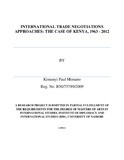International trade negotiations approaches: the case of Kenya, 1963 - 2012
| dc.contributor.author | Kimunyi, Paul M | |
| dc.date.accessioned | 2014-12-09T13:12:33Z | |
| dc.date.available | 2014-12-09T13:12:33Z | |
| dc.date.issued | 2014 | |
| dc.identifier.uri | http://hdl.handle.net/11295/76942 | |
| dc.description.abstract | International trade continues to be a central area of concern for academicians, policy makers and general citizenry of the world. This activity has been practiced the world over since ancient times and has seen most developments that have happened shaped and driven by the need to prosper in this field. The purpose of this study was to evaluate Kenyan case study with a special interest on international trade negotiations which are critical to international trade. Theoretically, the study was guided by Realism theory and Theory of Negotiations where the former has been very central in the study of International Relations and the latter has been critical in analyzing interactions in International Relations. The major findings of the study indicated that Kenya has not been able to benefit maximumly from international trade negotiations despite various efforts. The study recommended that the government needs to invest in perfecting the international trade negotiations mechanisms to improve the various strengths and also stem the weaknesses evident. | en_US |
| dc.language.iso | en | en_US |
| dc.publisher | University of Nairobi | en_US |
| dc.title | International trade negotiations approaches: the case of Kenya, 1963 - 2012 | en_US |
| dc.type | Thesis | en_US |
| dc.type.material | en_US | en_US |

